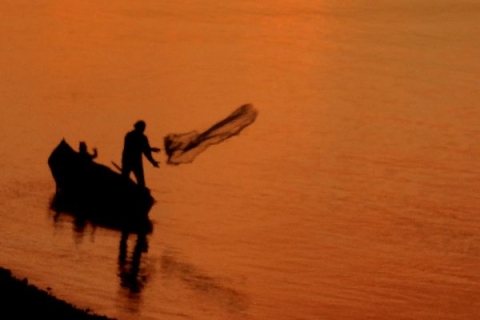

There is enormous potential to increase the productivity of African fisheries. There is also potential to improve coastal and marine health.
5 min read
The African continent produces seven million tonnes of marine fish a year. This capture has increased in recent years thanks to improved catches in west Africa and the end of Somalian piracy in the Indian Ocean.
But the growth in supply can’t match the growing demand. Africa’s population is expected to reach 1.7 billion in 2030 and 2.5 billion in 2050. Fish consumption is already 7.5kg per capita per year. It would need to grow to 13 million tonnes of marine fish in 2030 and almost 19 million tonnes in 2050.
These figures provide an idea of the scale of the production gap: about six million tonnes in 2030 and 12 million in 2050. Much change is required to reach such targets.
We did a study evaluating the potential for development of fisheries and aquaculture in the region to overcome this production gap and ensure the food security and livelihoods of the millions of people across the continent who depend on fisheries and fishery resources for survival and income.
Our main finding was that despite the pressures fisheries face, there is enormous potential to increase the productivity of the fisheries. At the same time there is potential to increase the health of coastal and marine environments and provide new avenues for job creation.
This review can be used to inform sustainable fisheries development and governance of sustainable exploitation of fisheries resources. This is particularly important given the increasing attention given to the development of Africa’s “blue economy”.
Threats and opportunities
Climate change and the associated alterations in fish distribution patterns pose significant threats to catch potential and to the security of coastal communities. Reductions in water quality through pollution, habitat destruction, and unsustainable and destructive fishing practices imperil the ability of ecosystems to support fisheries.
It’s hard to manage ecosystems effectively when there is a lack of information.
Fish don’t stay within national boundaries and this raises complex issues. Jurisdictions overlap and governance of fish resources is poor at all levels. It has tended to focus on volume of production. This combination of issues has already caused the over-exploitation of all major fish resources.
Despite the threats, there are still opportunities to secure the future of African marine fisheries.
Firstly, the continental fish market is large, with high demand and increasing purchasing power. Africa is a net importer of fish but has the potential to become a net exporting continent.
Secondly, there is increasing attention and finance being invested in the health of ecosystems. Efforts are being made to mitigate biodiversity loss and the effects of climate change. Coastal ecosystems have an important role in carbon sequestration and coastal protection. Restoring them helps protect fishery resources.
Lastly, with the increasing importance of developing the blue economy, fisheries are being integrated into a much wider management system. They are gaining increasing attention for their contributions to blue growth.
Securing the future
Making use of these opportunities has the potential to significantly increase the production of Africa’s marine fisheries. There are three key areas of intervention:
-
restoring ecosystems to health
-
improving the sustainability of fisheries operations
-
improving harvest and post-harvest chains.
According to our analysis, restoring ecosystems to a healthy condition could increase fish production by 50-60%, adding 9-10.5 million tonnes to annual net supply by 2050. Healthy ecosystems have more abilities to provide precious services to humans, and more so the fisheries. Healthy ecosystems act as nurseries, feeding grounds, and breeding grounds for various species important to the fisheries.
This value can be exceeded through more accurate valuation of ecosystems, increasing the role of marine protected areas in fisheries management, and improved marine spatial planning.
A further two to three million tonnes of fish net supply could be delivered by 2050. It can be done by improving the sustainability of fisheries operations and reducing the environmental footprint of fleets and processing industries.
Proper transboundary management should focus on resolving foreign access agreements, and addressing informal and illegal fishing.
Operations can do more to limit the waste of bycatch and discard.
Improving harvest and post-harvest chains has the potential to deliver 1.5-2 million tonnes net supply by 2030. Scaled-up mariculture (fish farming) can offer two to four million tonnes. Adding value to products – for example smoking and drying fish – can reduce losses that are now 35% of harvests.
Finally, Africa can reduce its vulnerability to external shocks by boosting intra-regional trade and limiting exports. The nutritional needs of African nations should come first. Links at the African level need to be forged and investment channelled into regional collaborative mechanisms for trade.
For each of these four areas of intervention, specific solutions exist. Most of them have already been implemented with success – they just need to be promoted and scaled up.
Within the current continental, regional and national blue economy schemes, pathways are available to integrate fishing with restoring ecosystems. Together they can provide benefits for biodiversity, food security, and climate change mitigation and adaptation.
Antaya March is Senior Research Associate in School of the Environment and Life Sciences in the Faculty of Science & Health.
Professor Pierre Failler is a professor in Economics at Portsmouth Business School in the Faculty of Business and Law.
This article is republished from The Conversation under a Creative Commons Licence. Read the original article.
More The Conversation Articles...
The Conversation is an independent source of news analysis and informed comment written by academic experts, working with professional journalists who help share their knowledge with the world.
ICC upholds jail term for Ugandan rebel commander Ongwen - why it matters for Africa
17 December 2022
4 min read

Kenya and the ICC: law expert answers 4 questions following death of a key lawyer
Tonny Kirabira writes in The Conversation on how the International Criminal Court investigation in Kenya can still reopen cases against President William Ruto and his predecessor Uhuru Kenyatta if it lands solid evidence.
30 September 2022
5 min read

How multinationals avoid taxes in Africa and what should change
Jia Liu
5 April 2022
7 min read

